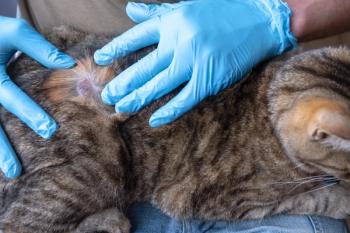
A consumer claims victory in S.C.
National Report - Consumers chalked up another victory in the battle of the public's right to know vs. a veterinarian's right to privacy.
NATIONAL REPORT — Consumers chalked up another victory in the battle of the public's right to know vs. a veterinarian's right to privacy.
Pro and con
A new state law in South Carolina requires complaints against DVMs be made public earlier in the review process.
The change to the state's veterinary practice act opens disciplinary hearings to the public and allows for public disclosure of complaints even before a disciplinary hearing is scheduled.
A majority of states typically have information available once a formal charge is established. Some do not release any notification until the disciplinary hearing is concluded, explains Dale Atkinson, an Evanston, Ill., attorney who serves as general counsel for the American Association of Veterinary State Boards (AAVSB).
The line between protecting a veterinarian's privacy and informing the public of possible negligence appears blurred.
Vilifying veterinarians?
Opinions on the South Carolina action differ.
Some feel that releasing complaint information before it is properly investigated and substantiated by a state board can damage a veterinarian's career and reputation unnecessarily.
"I think the outcomes (of disciplinary hearings) should be made public, but the complaints should be kept private," says Robert Newman, an animal-law attorney in Santa Ana, Calif. "Anyone can make a damaging allegation that is not true and because people tend to believe everything they read, this would be unfair to the veterinarian."
If publicized before wrongdoing is established, the complaint could create the risk "that the reputation of the veterinarian will be damaged when he or she did nothing wrong," Newman says.
"The public is not held to the standard of knowing what is always appropriate or inappropriate in terms of treatment," he continues. Reviewing and investigating complaints before they are released can help prevent unsubstantiated claims from tarnishing a DVM's name.
The fight for transparency
But some consumers have a different perspective — that open disclosure gives information about a veterinarian's entire history in order to make informed choices of doctors.
"My position all along has been the public has a right to know," says Marcia Rosenberg, a Mount Pleasant, S.C., animal advocate and lobbyist who strongly backed the state practice-act change.
"I want a good source of information before I go to anybody and entrust him or her with my physical and mental well-being or that of my animals," she says. "I want to know if a veterinarian has a long complaint history or any complaint history. I feel there should be more disclosure and accountability."
In place of uninformed pet owners will be increased public awareness, Rosenberg contends, recalling her first experience in an open disciplinary hearing — in which formal charges were dismissed — as an example. "Being in the room and hearing the whole situation, I agreed [with the dismissal]. If I had to vote, I would have voted that charges be dismissed. I sat there and said, 'My goodness, why didn't this happen earlier?'" says Rosenberg of the open-hearing format.
Internet vigilantes?
Yet many consumers are not waiting until laws are passed on open information — they are taking action on their own.
South Carolina veterinarian Thomas Sheridan, owner of the Folly Road Animal Hospital in Charleston, knows the power of the Internet all too well after being named in multiple state-board complaints and lawsuits.
The complaints generated a campaign, complete with Web site, with the stated purpose of providing complaint, suit and settlement information documents "to assist members of the public with reaching their own conclusions and making informed decisions." The Web site is titled "Sheridan Truth: Learn the Truth about Veterinarian Thomas Sheridan,"
The site includes photos of the doctor, links to public documents relating to the complaints and legal-action documents, directions on filing a state-board complaint and a blog open to public posts.
Newscasts relating to the Sheridan case have even made it as far as You Tube, a site allowing visitors to post videos for public viewing.
Only one complaint remains unsettled, according to the
Sheridan failed to respond to multiple telephone and e-mail requests by DVM Newsmagazine to comment.
What's at stake?
No matter how complaint information is handled, there are positive and negative effects for the subject in question.
"From the veterinary perspective, if the complaint is not made public, it protects them in the event that there is a frivolous complaint filed or one deemed to be without merit that does not need further investigation," Atkinson says. "The negative aspects of releasing the information would be the disclosure or exposure of a complaint. Then, perhaps, the media will write about it, and the veterinarian has to defend himself or herself, yet we don't necessarily have a final disposition of wrongdoing."
But should state boards be concerned about protecting veterinarians, or their animal patients?
Unless complaints are made readily available to the public from the time they are filed, pet owners may have no way of knowing they exist. "If there are pending complaints against a veterinarian, I as a consumer want to know, even if they are not public at that point," Atkinson says.
While it is a consumer's right to question his or her veterinarian about state-board complaints and actions, very few actually do.
"The consuming public generally is not sophisticated along those lines. It is just not in the norm of what people think about in a professional relationship between doctor and client. It may be an uncomfortable situation," Atkinson says.
Tattle-tale technology
Consumers are learning, however, that they can rely less on their veterinarian for complaint disclosure and more on their computer to get the scoop. Internet use continues to grow, spurring many pet owners to research and gather information independently.
"I think that in today's day and age, with technology and media and the Internet, consumers are becoming more sophisticated. Consumers can go online and look up a disease, drug regimen or treatment options. And all that is very positive," Atkinson says. "If that leads to more inquiries at the state boards, that is good."
Robyn Kendrick, AAVSB executive director, adds, "Being a member of the public, we have more of a desire to want information because it is more readily available. Because there is a vehicle to deliver it, there might be more of a thirst for it."
How that thirst will impact veterinarians in the future remains unknown.
Newsletter
From exam room tips to practice management insights, get trusted veterinary news delivered straight to your inbox—subscribe to dvm360.




